#Textual analysis
Text
They literally know how to do an "I'm sorry I couldn't say 'I love you' plotline" well because they did it with Mike in season 4.
"Best friends". They created a contrast AGAIN. Simple, casual, sweet. 'I'm sorry, here's why, best friends'. It's yet another reused but made to be dramatic with El. The first time was perfect: low stakes, earnest, not needed but he wanted to say it anyways. The second time was an attempt that didn't fill it's shoes: high stakes, necessitated, dramatic and incentivized.
Not just her life but we don't talk enough about how he thought he would lose her if he didn't say it but he didn't think he would lose Will. Will had already forgiven him at the top of their conversation but he kept talking. They had Will forgive him from the get-go to establish that the goal for Mike was never just to get Will back, it was to make him feel loved and wanted. It was to say "you forgive me and we are going to work together because everything is crazy but I want you to know that we aren't reuniting because everything is crazy, we're reuniting because I miss you and I want you back; we're reuniting because I want you here."
Mike and El had a nice moment but they didn't state security like they did with Mike and Will, in fact, they interrupted a suddenly serious moment. They could have just had the pizza thing. They could have had her say she forgives him even though he hadn't said it yet. But they didn't. He didn't have full reason to believe there wasn't still threat and their nice moment wasn't fleeting/outweighed by his actions. He had reason to believe he still needed to redeem himself. He didn't have that with Will.
#pizza scene#ily speech#apology scene#byler elmike contrasts#stranger things#byler#mike wheeler#textual analysis
21 notes
·
View notes
Text
Of things unsaid
AZIRAPHALE
Ah, yes, I thought perhaps they might send you. [beat]
Well.. [beat] I’m ready to go.
CROWLEY
Go where?
AZIRAPHALE
To Hell.
CROWLEY
I’m not taking you to Hell, angel.
Notice Crowley doesn't confirm or deny being sent to take Aziraphale to Hell. Just that he - who was ordered to slaughter the blameless goats of blameless Job's and did. not. do. it. - is not doing this either.

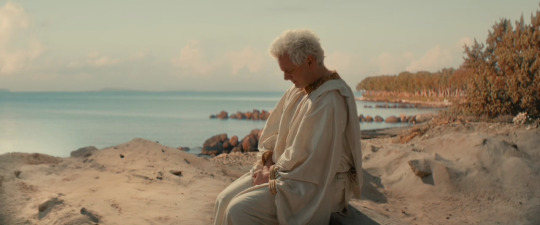


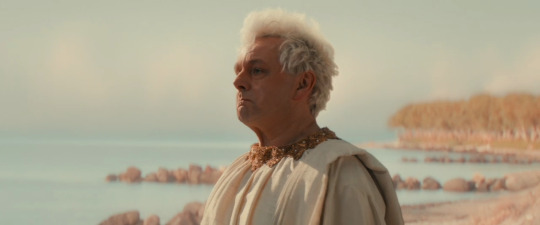



AZIRAPHALE
Why not?
CROWLEY
Well, I don’t think you’d like it.
"Why not?" is answered with a deflection that is more or less an "I don't want to," and very much not a denial that he was sent to do it. And if not liking Hell is a reason for an angel to not be taken there, no angels should ever have gone. It is by definition and design a miserable penal colony for wayward angels, such that none of them like it.


AZIRAPHALE
But you have to. I’m like you now: A demon.
CROWLEY
(laughing) Sorry. You think you’re a demon? With your
curly little… and your neat white…
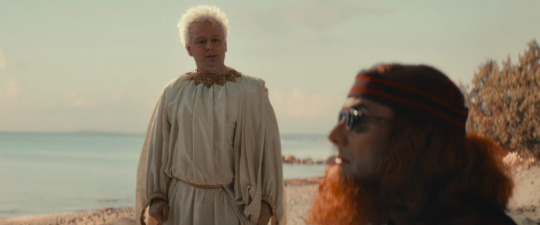
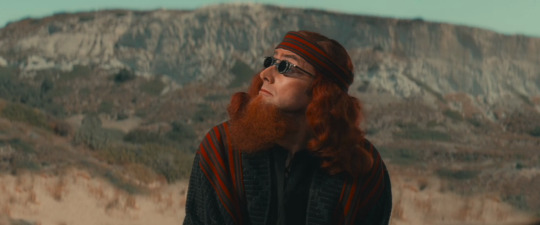
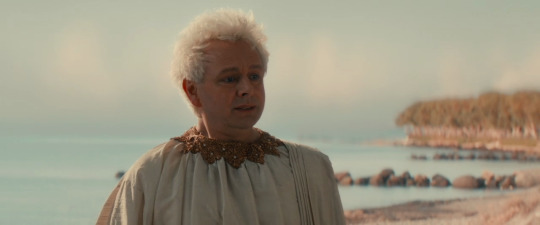



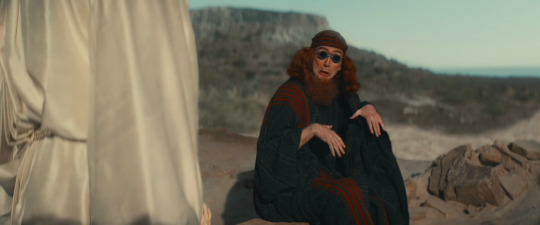
Making fun of Aziraphale for suggesting that he's a demon is another deflection. Crowley does not deny Aziraphale's claim/worry/supposition that he is a demon. It's implied by the joke that he isn't, but only because the joke relies on the incorrect premise that demons cannot have cute curly hair or neat white clothes, like it's an immutable law of celestial physics or an unbreakable sumptuary law. Hmm...
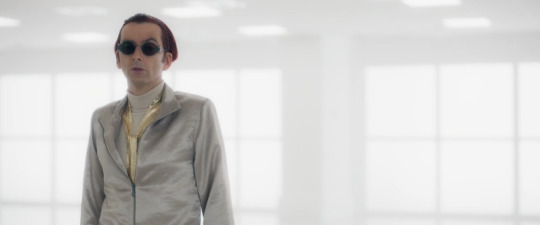
I'm not even going to bother showing you images of Crowley's curly hair because we both know there's more pictures of his curly hair on your phone than there is of your own family.
AZIRAPHALE
I’m a fallen angel! I lied. To thwart the will of God.
CROWLEY
Well, yeah, you did but… I’m not gonna tell anybody.
Are you?
AZIRAPHALE
(Shakes head no)
CROWLEY
No. Then nothing has to change, does it?
Again Crowley does not deny Aziraphale's assertion that he is a Fallen Angel, whereas, tellingly, he does confirm that Aziraphale lied to thwart the will of God. Then they enter into their first ever arrangement, which is quite possibly thwarting the will of God even more.
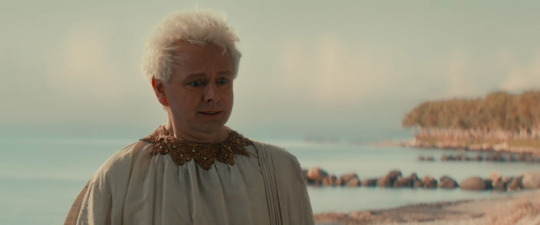
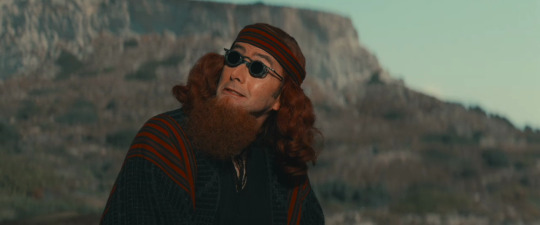

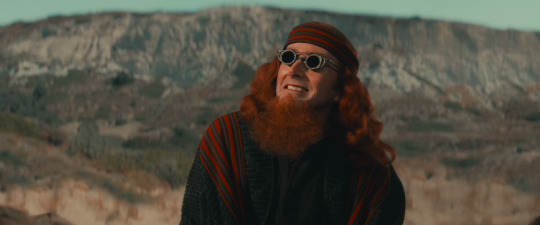
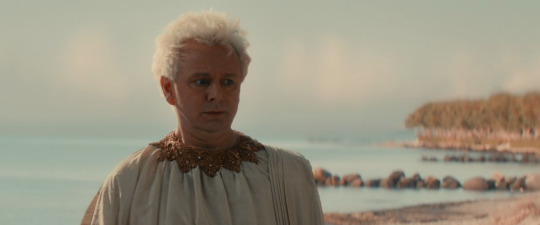
AZIRAPHALE
(long pause) But what am I?
CROWLEY
You’re just an angel who goes along with Heaven as
far as he can.
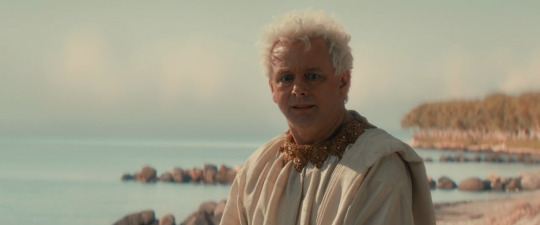

That sounds like a shift away from the Heaven faction to me. One very fascinating thing about Good Omens, the magic of holy water and hellfire notwithstanding, there doesn't seem to be much difference between angels and demons beyond aesthetics and political faction. Even being "good" or "evil" is an aesthetic. None of the demons seem to actually know what "evil" is and are flummoxed when humans come up with far worse than occurs to them. Most of the angels do horrible things but call them "good," a rose by any other name and all that.
AZIRAPHALE
That sounds um…
CROWELY
Lonely?
AZIRAPHALE
(Nods)
CROWLEY
Yeah.
AZIRAPHALE
But you said it wasn’t!
CROWLEY
I’m a demon. I lied.

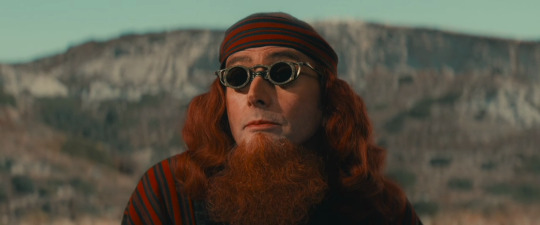
Nice touch, that, lamp-shading lying by bringing it up in a conversation that one can easily suspect may be constructed out of a pile of lies (even if they are lies of omission)
In light of all that, I would like you to think about the poetry of this scene in which Aziraphale, never having had his Grace boiled out of him in Hell, excises it himself or some goodly portion of it anyway, and casts it down with his own hand, for his own reasons, with his own free will.
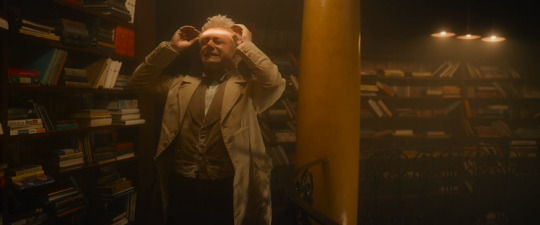
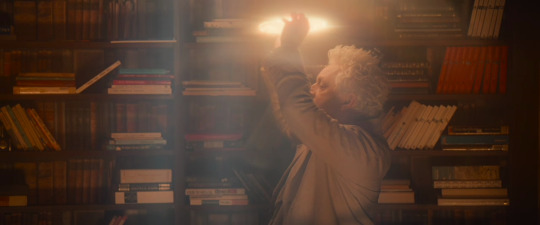
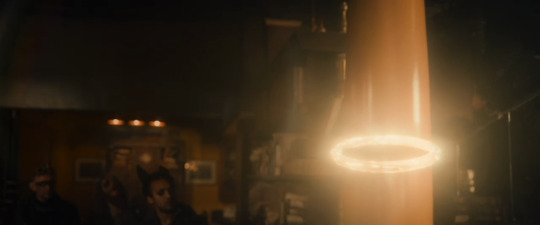
#good omens 2#meta#textual analysis#aziraphale#angelic halo#subtext#I feel that the later scene echos the former#grrr tumblr won't let me format this like a script
278 notes
·
View notes
Text
Dustin's insecurity/loneliness is really showing in s2
I've always thought of Dustin's season 1 line 'I know Lucas is your best friend and it's okay, Mike, I get it' as the biggest example of how he feels lonely and insecure despite his friendships...
But idk how I overlooked this line from s2
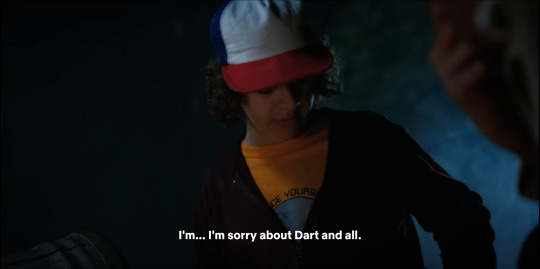

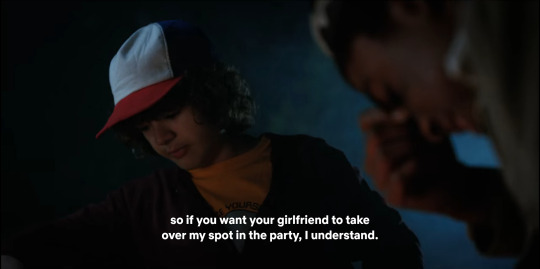
Lucas and Dustin both messed up, Dustin by lying about Dart and Lucas by telling Max about the Upside Down - and they argued about that! But Dustin is quick to back down, and goes so far as to suggest Max replace him.
Bearing in mind they've only known Max for a few days at this point, and it's already been established that there isn't a set number of places available in the Party since El was added after s1, it's glaringly obvious that Dustin feels replaceable.
(Also, this isn't just an offhand, joking comment to act as a peace offering. By Dustin's tone and the fact he's looking down, avoiding eye contact with Lucas, you can tell this is a genuine worry of his.)
Lucas doesn't pick up on the strangeness of this offer, though, since he's distracted by the 'girlfriend' comment, and it goes unnoticed.
98 notes
·
View notes
Text
I think people need to be reminded that media literacy is an actual, extremely important thing and not just a fancy buzzword people throw around to look smart.
Media literacy is completely and unarguably absolutely vital in order for you to engage with media at all, not just extremely complex ones, and I am being dead serious. You cannot constantly refuse to actually think about something. You cannot refuse to read between the lines. You cannot refuse to actually use your brain when interacting with media, especially it actually is based around nuance and dark/uncomfortable topics.
You can't make everything black and white, and you can't refuse to ever thoughtfully engage with anything. Not only does it make you immature, but it also makes you extremely easy to manipulate. No one, and I mean NO ONE is immune to propaganda, but it is especially dangerous for people who can't even recognize that what they're seeing is propaganda in the first place. This is not a debate. If you cannot understand basic media literacy and analysis, then you are even more vulnerable to getting swept up in some really sinister shit because you simply couldn't recognize the red flags and took everything at face value, or deliberately refused to actually think about any other possible implications.
People who refuse to learn media literacy and understand why certain pieces of art exist and are important are a massive reason for things like book bannings. Why do you think books like Lolita are still so controversial and still has so many people insisting that it romanticizes child sexual abuse? It's because they refuse to actually read the fucking book and really think about what it's trying to say, and how it's saying it.
Or if you want a more online example, why do you think fandoms for really heavy and mature pieces of media still have people that refuse to acknowledge and talk about the actual media and its messages, metaphors, etc? Why do you think so many people grossly misinterpret and misrepresent characters and stories that have any amount of nuance or development? They refuse to accept that media is not, nor should it always be "easily digestible" or "comfortable"
Believe it or not, sometimes art is SUPPOSED to make you uncomfortable. Sometimes art is SUPPOSED to make you rethink yourself and your own ideologies and world views. Sometimes art is SUPPOSED to have a message in the story it tells, and that message needs to be analyzed and talked about in an actually meaningful and mature way.
You don't get to just ignore the entire point of more heavy and mature media just because it's uncomfortable for you, or because "you just aren't good at media literacy" or because "all you know is your little blorbos" or whatever the fuck. You do not get to sweep meaningful and extremely valuable stories aside and ignore everything about them other than makes you comfortable.
And don't even try to say "But that's what fandom does, that's to be expected!" because that is not the winning defense that you think it is. Tell me, do you truly believe that it's good, constructive, and healthy to have massive groups of people all sharing the same incorrect and potentially harmful information and incorrect readings of something that is meant to have a real point and message? Do you really think that it's a good thing that people are refusing to read into heavier and more mature works just because "They're too silly for media analysis uwu"? Do you genuinely believe that that sort of space is going to lead to anything good? "It's just how fandom is!" is not an excuse for you to refuse to use your goddamn brain and actually think critically about a piece of media for once.
If you don't want to talk and think about such heavy stuff, then find a different piece of media. Find something that's more to your tastes than bastardizing and spreading misinformation about something that is supposed to be layered, nuanced, and yes, even uncomfortable. Don't come into a community for a piece of media that is mature and nuanced and get pissy when people are discussing that media in a mature and nuanced way. Take a second to think that maybe you aren't the person that this media is for, actually.
Don't be surprised when people get annoyed with you for refusing to actually use your brain when engaging with something. Don't be surprised when people tell you that it's not funny or cute that you don't understand the basics of metaphors, symbolism, or allegories. Don't be surprised when people tell you that a piece of media is not for you because you refuse to actually appreciate and respect it for what it actually is, and instead turn it into something completely different.
Sometimes there is a reason that the curtains are blue, and you're gonna have to learn to accept that. The world isn't black and white, and neither is the art that people make.
Don't get mad at other people for actually acknowledging that and talking about it.
43 notes
·
View notes
Text
Bio
𑁤 . 𝓜.𝑦 ୬ 𝓛 𝑜͟𝑣͟𝑒 ㅉ
⠀⠀⠀⠀⠀⠀⠀⠀⠀ 𝟏𝟕. 𝑑𝑜𝑙𝑙 ⭑
[c] ࣪⋆་ ˖ . ︶⏝︶⏝ ୨ ♡ ୧ ⏝︶⏝︶ . ˖ ་⋆ ࣪
[C]ၪ ꪝ𝖾𝗅ᴐ𝗈𝗆ә᳟ Პ 𝗍𝗈 ꭑ𝗒 Კ 𝗐᷍ꞝ𝗋𝗅𝖽 𖧧
[C]ꜜꜜ ᳦ 𝑡𝑖𝑛𝑦 𓅫͟ 𝑝𝑜𝑒𝑚𝑠 ﹏
[C] ꞝ 𝗌𝗁𝖾/𝗁ᥱ ⁇ 𝗏𝗂𝗋᳕𝗀ᦒ ᳧ 𝖾𝗌𝘁𝗷 ✩
[C] ⎯⎯⎯⎯⎯⎯⎯⎯⎯ း 𝕞𝗈𝖼𝗁¡ ͮ 𑄹
[C]︵︵𖥔︵︵𖥔︵︵ ﹝ ❀ ﹞︵︵𖥔︵︵𖥔︵︵
[C]،̲،̲ 𝐸𝑡𝑜𝑖𝑙𝑒 ٫ ⋆ 𝟏𝟏 𝑓𝑙𝑒𝑢𝑟 𓁐 . 𝟣𝟣
[C]〖 谷 〗 𖦳 ᰨ 𝗍ᥕ𝗂𝖼ᥱ ꜝ ㅎ 𖥻 𝓂𝒸
[C]⩅ ᰛ 𝑦𝑜𝑢⃑𝑛𝑔 𝑓𝑜𝑟𝑒𝑣𝑒𝑟 ⎯⎯᳝ ᳝⎯⎯⎯⎯⎯ ⎯⎯⎯
like or reblog if you use/save !!
#short bios#biography#link in bio#coquelicot#coquette#flora coquerel#símbolos#symblos soft#symbols#textual bios#textual analysis
358 notes
·
View notes
Text
William Blake and Good Omens - an intertextual analysis
Please note: I did another version of this and posted it, but it was quite hurried, way too short, and was incorrect in a number of ways so I deleted it. However it had already been reblogged by the time i did so. If you happen to see another version of this meta that's not the right one, this is the version I'm happy with!
After my previous post re William Blake and Good Omens did so well, and so many people showed an interest I've decided to do a more in depth piece. This is focused upon the TV version of Good Omens, not the book.
Please don't tag Neil in this - although it's mostly textual analysis I do a very small amount of S3 theorising, and I know he doesn't want to see that.
I am in no way suggesting that Neil and Terry specifically wrote Good Omens with Blake in mind, I honestly just wanted an excuse to write more about Blake because I love his work so much, and I thought it would be interesting to try and apply some intertexuality since the works will contain similar themes, both being about God, religion, humanity, and angels and demons.
I also should stress that I am not an expert on Blake, there are people far more qualified to comment on him than I. I'm just a former literature student who loves his work.
There have been many different interpretations of Blake's work over the years, so it's completely fine to disagree with someone else's ideas about it, as with any work of art or literature. And although this piece is likely to be long, I'll barely be able to scratch the surface of all the possible meanings that could be ascribed to it.
Much like the old adage that if someone claims to understand quantum physics they're lying, I'm not sure anyone can truly fathom the full meaning of Blake's philosophy (especially in his later prophetic works, fuuuuuuck those beasts....), so if you're confused by him don't be discouraged, that's perfectly normal!
That being said, I wish to discuss the parallels between Good Omens and The Marriage of Heaven and Hell, my personal favourite and probably the most accessible of his longer works.
"Without contraries is no progression. Attraction and Repulsion, Reason and Energy, Love and Hate, are necessary to Human existence.
From these contraries spring what the religious call Good & Evil. Good is the passive that obeys Reason. Evil is the active springing from Energy.
Good is Heaven. Evil is Hell."
This excerpt is from near the opening and sets out the central idea of the work - that there is an essential duality to humanity, and each person is a combination of extremes. These extremes are not at war with each other, but rather are equally necessary, hence the "marriage" of the title. "The Marriage of Heaven and Hell" is a metaphor for the human experience.
Consistently throughout The Marriage... Blake refers to the two extremes as Reason and Energy. These terms could be construed in a number of different ways: thought versus emotion, mental versus physical, restraint versus desire, temperance versus excess, caution versus impulsiveness, and following the rules versus free will.
Blake's use of the word "Reason" in this context may be somewhat confusing, however he likely chose it because of his negative feelings towards science and the Age of Enlightenment. Blake saw literal visions of angels and prophets and the divinity of all creation, and hated that science reduced everything to formulas, calculations, and materialism, leaving the world bereft of wonder. "Art is the Tree of Life. Science is the Tree of Death" as he put it.
His ideas about "reason" are best expressed by his painting "Newton". Though inspired by the scientist, it is not a portrait - instead it depicts a figure deeply engrossed in scientific drawings and calculations, totally ignoring the beauty all around him - see below.
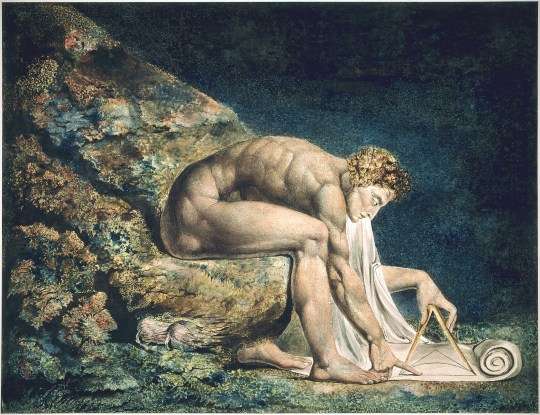
In the context of The Marriage... Reason is "passive" because it involves thought, caution, self-restraint, and doing what you are told, all states which block action. Energy is "active" because it is physical, emotional, impulsive and allows you to act based on your own choices and desires. It's quite clear that Blake feels "energy" is the preferable state - he tells us as much in the next section:
"The Voice of the Devil
All Bibles or sacred codes, have been the causes of the following Errors.
1. That Man has two real existing principles Viz: a Body & a Soul.
2. That Energy, call'd Evil, is alone from the Body, & that Reason, call'd Good, is alone from the Soul.
3. That God will torment Man in Eternity for following his Energies.
But the following Contraries to these are True.
1. Man has no Body distinct from his Soul; for that call'd Body is a portion of Soul discern'd by the five Senses, the chief inlets of Soul in this age.
2. Energy is the only life and is from the Body and Reason is the bound or outward circumference of Energy.
3. Energy is Eternal Delight."
So the body is an aspect of the soul, not separate from it, Energy comes from the body, it is Reason which places limits upon Energy, but Energy is eternal delight. Physicality, desire, impulsiveness, emotion, sensual pleasure and free will are not wrong or evil, they are aspects of the human soul and it is from them that we derive our enjoyment of life.
This does not necessarily mean that Reason is always bad. After all, Blake tells us that both are necessary for human existence. Sometimes temperance, caution and thought before action are required. But Reason becomes negative when it "usurps its place and governs the unwilling", i.e. when it completely supplants Energy and becomes the sole guiding factor, forcing passivity.
The Angels of The Marriage... are governed by "systematic reasoning", therefore they are wholly creatures of Reason. They are also "all religious" meaning they believe the "errors" stated above. His Devils by contrast "hate religion" meaning they believe the "contraries", which are the true statements according to Blake. It does not necessarily follow that they are wholly governed by Energy, merely that they believe Energy is "eternal delight".
It is worth noting at this point that Blake saw God and religion as totally separate. For Blake, "God" is that connection with divine wonder which was integral to his life; he tells us plainly that "all deities reside in the human breast" and that "the voice of honest indignation is the voice of God". In other words all humans have a direct and intuitive link with God and don't require the church, Priests, or a religious framework and adherence to a set of rules in order to reach moral decisions. These rules exist only to "enslave the vulgar".
The importance of this ability to make one's own choices about a moral course of action is shown by one of the "Memorable Fancy" sections of The Marriage...
Blake relates how a Devil is able to use an Angel's "systematic reasoning" against them:
"if Jesus Christ is the greatest man, you ought to love him in the greatest degree; now hear how he has given his sanction to the law of ten commandments: did he not mock at the sabbath, and so mock the sabbaths God? Murder those who were murder'd because of him? Turn away the law from the woman taken in adultery? Steal the labor of others to support him? Bear false witness when he omitted making a defence before Pilate? Covet when he pray'd for his disciples, and when he bid them shake off the dust of their feet against such as refused to lodge them? I tell you, no virtue can exist without breaking these ten commandments; Jesus was all virtue, and acted from impulse, not from rules."
The Angel has no way to refute the "reasoning" that Jesus was governed by Energy and "impulse", i.e. his own morality, the "voice of righteous indignation", not reasoning and the rules laid down by Heaven. And because Jesus is the Messiah he must be virtuous, therefore Energy is virtuous. The Angel immediately allows himself to be consumed by fire and is resurrected as a Devil.
How can these concepts apply to the world of Good Omens? This was where my first draft was totally incorrect, as I tried to transfer Blake's ideas about Angels and Demons and Heaven and Hell wholesale, applying "reason" to Aziraphale and Heaven and "energy" to Crowley and Hell. In fact the divide is slightly different in the GO-verse: Crowley and Aziraphale *both* represent Energy, and it is Heaven and Hell that act according to Reason.
At first glance Aziraphale may appear to toe the line - he needs creative application of the rules to make him comfortable with trying to avert the apocalypse, and when he doesn't like the way matters are being handled by the Archangels he seeks a higher authority and goes straight to God. He'd clearly prefer someone to be confirming the rightness of his actions for him. However this doesn't mean that he won't act on his own.
Immediately upon his introduction to the story he has given away his flaming sword, an action that he took impulsively because he felt it was right, not because someone told him to. It bothers him, but he does it anyway.
In the Job storyline, though he initially looks for some loophole within the rules that will allow him to save Job's children, in the end he directly goes against Heaven to do it, even though he believes he is going to Fall and become a Demon for having done so.
Though he resists it and exhausts all other possible avenues first, he eventually does take an active role in averting the apocalypse in S1.
He hides Jim at great personal risk to himself and against the will of both Heaven and Hell, again because he feels it is the right thing to do.
He is therefore perfectly capable of independent action from a position of "righteous indignation".
On a more basic level, he enjoys worldly pleasures, which all come from "energy" according to Blake's philosophy. Food and drink most obviously, but also books, music, dancing, theatre, art and so on.
Crowley is more easy to place as acting from Energy - in spite of the obvious aesthetic differences between them, he also loves worldly pleasures. Alcohol and coffee, snazzy clothing, driving his car with Queen blaring on the stereo, going to lunch with Aziraphale, Shakespearean comedies. All things he isn't supposed to want or need, and which baffle other Demons, in the same way that Aziraphale's desire for food baffles the Angels.
And he's absolutely willing to act according to his own moral impulses when they conflict with Hell's orders (or Heaven's), be it saving Job's children, ensuring that Elspeth doesn't die by suicide, or averting the apocalypse. Yes, he'll try to hide his "good" actions in order to avoid punishment by Hell, but he's firmly "on his own side".
Conversely, Heaven and Hell are both part of the structure of religion in this story, are strictly adherent to a set of rules, and their inhabitants appear to have no real desires of their own, other than possible advancement within the systems they uphold. They are "passive" in that their functions allow the status quo to continue and the "great plan" to unfold as they believe it is meant to, even though each side expects a different outcome.
Again, applying Blake's philosophy, I would say the reason for this is that "energy is from the body". Crowley and Aziraphale have both been given bodies in order that they can exist on earth, and *have* existed on earth for 6000 years, therefore "energy" - physical pleasures and free thinking - have become a part of who they are.
On a more fundamental level, possession of a body can be equated to humanity, and humanity has been shown as the most powerful force of all in this story, its influence having led to Adam becoming "human incarnate", and thus acting according to what he feels is right, instead of fulfilling the function he was destined for.
Heaven and Hell contain no material objects, and the Angels and Demons are spiritual beings, having no bodies, so they are not open to energy, and therefore are wholly governed by Reason, and the preservation of the religious structures within which they exist. Structures which, as for Blake, may not actually have anything to do with God herself. In S1 she is a distant observer, clearly aware through her narration of all that is going on, but not interceding in any way. In S2 she is barely present save for her voice being heard briefly in Job, and overlaid with Gabriel's on two occasions.
Bearing all this in mind, what predictions can we make regarding S3 by applying Blake's philosophy?
"The ancient tradition that the world will be consumed in fire at the end of six thousand years is true, as I have heard from Hell.
For the cherub with his flaming sword is hereby commanded to leave his guard at [the] tree of life, and when he does, the whole creation will be consumed and appear infinite and holy, whereas it now appears finite and corrupt.
This will come to pass by an improvement of sensual enjoyment."
The parallels of the cherub with his flaming sword, and the passage of 6000 years should be obvious to anyone reading this - they have of course been lifted directly from the Bible as they are in GO.
I have read some metas which speculated that Aziraphale's bookshop, or perhaps Earth itself, is a metaphorical stand-in for Eden or The Tree of Life. Aziraphale has been commanded to leave his "Eden" and will now be instrumental in causing the whole of creation to become infinite and holy, but Blake tells us this will be done by an improvement of sensual enjoyment, which arises from Energy not Reason.
Sensual enjoyment is something which is intrinsic to Aziraphale's character, and this could make his placement in Heaven very important.
Putting aside all the "final fifteen" theories and taking matters at face value, Aziraphale tells us that if he's in charge he can make a difference - he needs to subvert the system from the inside out. The most subversive thing of all could be that a sensualist who acts according to "the voice of moral indignation" and "Energy" has become the supreme Archangel. We have seen in Blake how a realisation that Energy could be virtuous was enough to convert an Angel into a Devil (incidentally, does the image of an Angel being consumed by fire and emerging as a Devil seem familiar at all...)
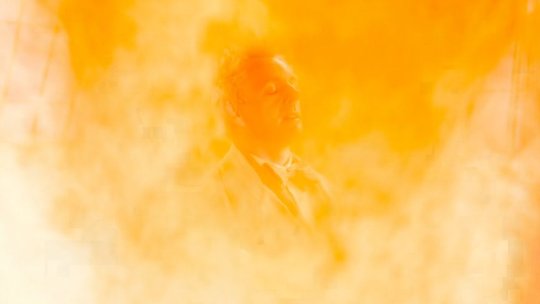
We may have seen the beginnings of this already. Gabriel and Beelzebub became open to Energy from such little things as visiting earth, spending time in one another's company, and their mutual enjoyment of a song, which has given them wants and desires beyond those dictated by Heaven and Hell. This is enough to make them wish to leave their roles behind.
It's possible that the same may happen with Muriel. They haven't yet imbibed food or drink, but they have shown an enjoyment of books, which are an earthly pleasure, and open the reader up to new ideas and ways of thinking.
Of course, this would lead to questions regarding the Metatron's statement that he has "ingested things", and whether this means he is acting from reason or energy. Of course the simplest explanation is that it is a manipulation tactic, and he is lying about having done so, but if true that statement has some interesting implications. However, this is now super-long and I'm out of juice, so will leave others to speculate. I may return to this in the future!
There we go, hope you enjoyed. I doubt this will reach nearly as many people as my first Blake post, but if a few find it of interest then my work is done!
#good omens#good omens 2#go2#crowley#aziraphale#good omens tv#good omens meta#good omens s2#good omens season 3#good omens s3#good omens brainrot#william blake#the marriage of heaven and hell#poetry#poems and poetry#books and reading#english literature#Textual analysis#intertextuality#good omens theories#good omens thoughts
44 notes
·
View notes
Text
okay so i just had this thought and need to write it down before i forget BUT tma is such a fascinating subversion of the "woo spooky cult is actually just christianity" thing so far. I'm partway into season one so i can't attest to later seasons, but it's such a brilliant example of how to use the trappings of religion without actively condemning that actual, real world religion and risk alienating a portion of one's potential audience. every time that my dude jonathan sims has taken a statement that has to do with the church in some capacity (like that priest's statement in episode... 15, i think? 16?) there's always a moment where the person giving the statement is in some way like "oh i thought this was christianity, surprise this isn't the christian God doing this it's actually something different and MUCH MORE EVIL, woo spooky thing~," which is so interesting in a media culture that is saturated with the default idea of cults being people who just have a grossly incorrect image of the bible's teachings and use that to start killing people or whatever. like, i went into that episode (and the one later about that girl and her roommate who joins a cult) fully expecting the message to be "christianity is bad" and instead it was "this particular cult or thing is actually distinctly different from christianity, but is definitely Very Bad," which is neat and just really refreshing in a way i didn't expect it to be. anyway yeah so i knew tma was cool but now i'm realizing it's cool in different ways than i expected
#tma#tma podcast#the magnus archives#jonathan sims#textual analysis#or more like podcast analysis i guess?#anyway tma is cool#i'm not getting the vibes that tma is necessarily made specifically for christians by any means#but i appreciate that the writers have thus far taken a moment to say that while this may not be made for christians#they aren't going to go out of their way to bash christians either
42 notes
·
View notes
Text
Since the Hbomberguy video has dragged everyone back into talking about academia, I have a rant:
The take, "Academic papers and academia in general tend toward a writing style that is intentionally inaccessible to maintain standards of ableism and academic elitism" (woke) is not the same statement as, "Because I do not understand this thing about this topic I have never researched at this level before, the work is inaccessible and therefore in Bad Faith™️" (not only broke but fucking wild).
Working as an academic advisor in my senior year, my specialty was helping people with writing. That included reviewing essays and helping with research mostly, as both of my degrees are research and writing intensive. Even with the MANDATORY Introduction to College Writing class freshman were forced into - unless, of course, you either tested well in AP English Language or passed the writing assessment that allowed you to skip the course (which most people didn't) - I often found myself explaining that academic papers are written with the understanding that the reader already possesses some meaningful amount of context. Students would come to me with full confidence just to show a paper reliant on paraphrasing and regurgitating the source text, ended with whatever hand-wavey, unresearched thoughts they had while reading and call it /Analysis/. Thus would begin the long, arduous process of teaching them how to actually research and structure an academic essay from scratch, down to identifying reputable sources and deciding how many is too many quotes.
As such, while it saddens me to see people put off of academic writing (and research as a whole) for the reason of inaccessibility, I get it. Disregarding the prevalence of paywalls blocking credible published works from the public, I'd argue that most papers assigned to studentsr weren't actually written for students. The 25 page article in the well established medical journal is going to be laden with esoterica and intracultural references; it was written for peer review by other professionals in their field with a baseline of pre-requisite knowledge. Similarly, if you're doing independent research and just roll into a random a decades old article you found on Google Scholar, it's likely to be confusing if you have no backgound in the topic. The expectation that anyone can just dive into a research paper written by an expert and immediately grasp the information provided completely misses the fact that learning is an active practice requiring critical thinking and access to reliable resources.
Why does that matter? Because the core facet of research is taking that confusing, inaccessible academic journal or data and /making it make sense/. Taking the time to learn terms you don't recognize, to read ALL OF the provided context, to reword and recontextualize the information to be digestible to an audience without expertise on the topic, that's THE POINT. When an assigment asks for ten sources, it's not for the sake of making you work harder. The entire exercise is to have you compare and contrast things like word choice, historical context, and author bias so you can synthesize your own understanding of the topic. Entire categories of the research and essay writing community exist simply for this goal: to make complex academic literature accessible to general audiences. It's what Internet Historian and Illuminaughti (fuck if I spelled that right) were pretending to do!
There are a lot of valid points to be made in the discussion of academia being inherently inaccessible. Unfortunately the Internet, specifically social media, has a way of boiling actual conversations down to the bare bones of "Is hard and I don't like it, therefore is bad."
(Note: This does not apply to professors/educators assigning a bunch of text without doing any actual teaching. Expecting everyone to be able to read something and just get it isn't a "challenge in critical thinking", it's bad teaching and makes things harder for people who may already find a learning challenging or inaccessible. Do better. )
Is academia filled with conventions that make it widely inaccessible to people from all education levels? Yes.
Do some people write with as many big words or as much autofellating fluff as possible purely for the purpose of sounding smart? YES.
But, as an academic writer and reader myself, and as a person with a bevvy of peers I respect deeply in the field of research, a significant amount of these articles are written in good faith by people who are using the vocabulary they have. The use of "big" words, esoteric references, and hyper-specific language isn't based in the desire for exclusion, but rather clarity for a peer group who are comfortable with the language being used is it's intended context.
Sorry about all this. I just actually enjoy academia when it's about the love of learning rather than being a pissing contest/bitchfest. Ignore me 😭
#academia#critical thinking#research#hbomberguy#academic writing#textual analysis#accessibility#accessibility in academia#rant#essays#education#college writing#what if we focused on ensuring students had the necessary skills to consume complex theory???#what if we as a society prioritized critical thinking and media literacy????#what if instead of bullying people who don't even want to pursue higher education to go get degrees we present academia as a fun CHOICE???#also#professors and educators#you know DAMN WELL that college freshman won't get SHIT from a 50 page reading from a 50 year old academic journal#students need support and resources#most of these papers aren't even awful!#just stop throwing people into the deep end and expecting them to just “figure it out”#that's not teaching babes#that's laziness#and it's why so many people fucking hate school#and for my fellow writers#the difference is knowing your audience#and tailoring your work to their knowledge level
33 notes
·
View notes
Text
Not the fact that Mike is the only straight male character to not show interest in any girls that aren't his girlfriend.
Steve likes Robin and dates a lot in season 4. Lucas calls Phoebe Cates hot. Dustin has a crush on Nancy, likes Max before Suzie, calls Phoebe Cates hot, and tries asking other girls at the Snow Ball to dance after he's rejected. Jonathan has a momentary flirt with a goth girl at the Halloween party. Hopper calls his ex-wife in season 1.
Not even just boys, Robin also thinks Phoebe Cates is hot as well as Tammy Thompson, not just Vickie. Max and El(so this isn't a Milkvan thing) talk about Ralph Macchio being attractive and Max checks out Steve in season 4. Joyce dates Bob and takes momentary comfort in cuddling with Lonnie in season 1 in one scene. Even ERICA makes her doll makeout with Lucas' action figure in season 2.
Will doesn't talk about attraction at all. Neither does Mike, actually. He just has a girlfriend. He doesn't even talk about attraction to her, actually. Others do that for him. The closet he every got was hypothetical and gender neutral when telling El why the Snow Ball isn't for siblings. His actions seem to reflect attraction but the consistency of it is still...an interesting contrast.
Even his character description makes a point that he hasn't liked a girl before.
#stranger things#byler#mike wheeler is gay#gay mike wheeler#loosely as always#but...#textual analysis#mike wheeler#he ain't beating the allegations
360 notes
·
View notes
Text
Chay, Hope, and “The New Hunger”
An unnecessary metatextual analysis by an excited English MA queer.
So it all started with this shot from Episode 7 of KinnPorsche:
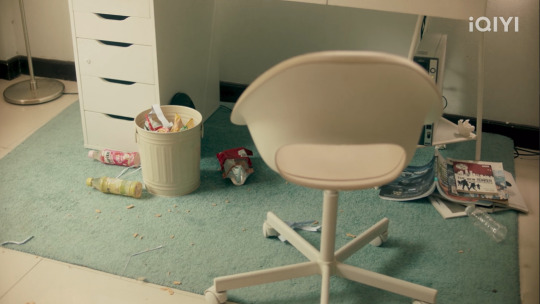
I zoomed in on the novel next to Chay’s desk out of curiosity and discovered that it was The New Hunger by Isaac Marion. Not a super old book by any means, and definitely one that Chay would realistically be reading.
Also a brief cameo that lets this single comedic shot FORESHADOW SO MUCH OF CHAY’S TRAGIC PLOTLINE without likely intending to do that at all.
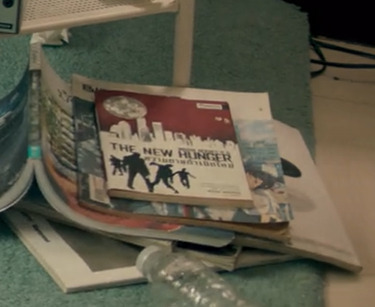
Because The New Hunger, published in 2013, is a functional prequel to Marion’s 2010 novel Warm Bodies.
Warm Bodies is by far one of the most beautifully written and engaging re-interpretations of Shakespeare’s “Romeo and Juliet” probably ever written (and I spent 3 summers at Shakespeare camp, so this approval is not coming from a casual fan perspective). There are zombies, apocalyptic drama, Daddy issues, and a LOT of stuff about not losing hope in the face of annihilation, loss, and loneliness.
R spends most of the novel talking TO HIMSELF and coping with HOW TO BE ALONE. He is doing exactly what Chay is forced to do for survival: Create his own joy and entertainment. He’s abandoned by the world around him and must fight at every turn to maintain a sense of agency, all while desperately clinging to the idea that hope is everywhere. Here are some of my favorite Warm Bodies quotes for perspective:
“It frustrates and fascinates me that we'll never know for sure, that despite the best efforts of historians and scientists and poets, there are some things we'll just never know. What the first song sounded like. How it felt to see the first photograph. Who kissed the first kiss, and if it was any good.”
“What wonderful thing didn’t start out scary?”
“You should always be taking pictures, if not with a camera then with your mind. Memories you capture on purpose are always more vivid than the ones you pick up by accident.”
“’What's wrong with people?’ she says, almost too quiet for me to hear. ‘Were they born with parts missing or did it [love] fall out somewhere along the way?’“
“The sky is blue. The grass is green. The sun is warm on our skin. We smile, because this is how we save the world. We will not let Earth become a tomb, a mass grave spinning through space. We will exhume ourselves. We will fight the curse and break it.”
“Deep under our feet the Earth holds its molten breath, while the bones of countless generations watch us and wait.”
BUT THEN YOU HAVE THE NEW HUNGER.
“Nothing is permanent. Not even the end of the world.”
“Enough white lies can scorch the earth black.”
“What happened? How did I get here? How could I have known that my choices mattered?”
“Crying. Expelling grief from the body in the form of salt water. What's its purpose? How did it evolve, and why are humans the only creatures on Earth that do it?”
He has not reached the point of exhumation yet.
Porchay must first be burned down. He must experience the hopelessness, loss, and devastation of betrayal first.
Like yeah, sure, this is a throwaway shot and someone on the set probably grabbed a handful of random books to use but HOLY FUCK they really could not have made a better (potentially) accidental choice!
Like... Jesus Christ in Heat do I love these books more than life itself. Warm Bodies is my second favorite book of all time and again, I read books for a living. You should go check them out if you like romance, comedy, zombies, or really just feeling good about the end of a novel. Isaac Marion will fundamentally change your life and the way you look at the world and it’s a wonderful experience.
But also the accidental foreshadowing of Porchay’s world being burnt up... of his memories being tainted and blackened by Kim’s lying and Porsche’s secrecy... Ugh it hurts. I am having some feelings in this Chili’s tonight.
#kimchay#kinnporsche the series#kpts analysis#kpts meta#kinnporsche meta#kinnporsche analysis#textual analysis#kimhan theerapanyakul#porchay kittisawat#kpts ep 7#kpts set analysis#isaac marion#THEY REALLY DID ME LIKE THAT HUH
78 notes
·
View notes
Note
My favourite thing when anons want to stir trouble is that like, inevitably they have consistent misspelling habits which mean you know exactly who it is sending repeat asks. So unself-aware.
Anyway, I do think there is a balanced path between the text and what the author says. GRRM's comments about Sansa are about as light as they could come. I love when people want to ungenerously frame the debate as if she's tantamount to Tyrian or Daenerys, come on. Girl took a steak knife to see a drunken knight in the godswood. The most harm she's going to inflict is driving Jon crazy with the incest. I'm trying to be lighthearted here.
Anyway, Rouka, what's your opinion on author vs. text? How much is too much, relying on the former? On the other hand, with the Daenerys is a tragic hero fandom, there's a lot of outright twisting of the text. Does relying on the author's comments provide some clarity or just make the conversation harder, since one would want to reason based on the text? Thank you for your time and your graceful handling of us terrible anons 🥰
(The posts referenced: one and two)
(I'm chronically bad at recognizing these individuall spelling patterns. Unless they make it obvious, every anon is a newborn dawn to me.)
Hello and thank you!
For me, the actual text of the books should always be central when it comes to actually analyzing the books. (You know. Obviously.) Interviews can be nice, but should be absolutely optional to any of it. If you NEED an interview to support your position, you're not analyzing the text.
Perhaps I am biased because I can't be bothered to follow GRRM interviews, let alone dig up ancient ones - unless I am feeling especially motivated.
But also, most of the time we don't have a lot of good context for GRRM's quotes. How exactly a question was phrased, what direction the conversation went before it, how distracted or rushed was GRRM when answering, how likely is it he actually managed to get across exactly what he meant, and how easily can it get twisted around? Who edited and published it? Worse, did it go through a translation process?
Take the "Aragorn's Tax Policy" quote that still has people frothing at the mouth. People hear him mention Tolkien and lose all sense of nuance. No, he's not describing how his endgame king will be elected on his tax plan. He's giving context for parts of ADWD. That's it. Still people wail about what an evil hypocrite GRRM supposedly is because Bran was crowned king in the show without a single published treatise on his taxation policy.
Same with some commentary on the show, specifically Dany with Drogo. I've had people in my Inbox arguing for Rhaegar/Lyanna because GRRM is obviously okay with adult men preying on teenaged girls based on that interview. Which... you know, actually read Dany's chapters? Please?
The books, on the other hand, were not blathered out in a hurry. They are not a commentary on a text, they are the text. A labor of many hours of writing, editing, rewriting and more editing. They are complete and fully intentional in their form. They are the message.
So, while I admire how someone who knows what they are doing is able to create a brilliant body of supporting evidence on book content by compiling quotes in a meaningful way, often with good sources and context - looking at you here, @kellyvela - these lovely metas should never be considered necessary to understanding the text, and they should certainly neither replace nor supercede it. They augment the experience of it.
Knowing GRRM approved on the Meereenese Blot essays is nice.
But you don't need to know them, nor what GRRM thinks of them, in order to arrive at the same conclusion.
Knowing GRRM agrees with the statement that "Brienne is Sansa with a sword" is nice.
But you need never have heard of that quote in order to understand the similarities between these two idealistic, dutiful female characters.
He called Tyrion a villain, which is nice.
But you can arrive at that same conclusion by reading the books.
On the other hand, you can take one quote about the Key Five Characters from a decades-old outline that deviates from established plot in multiple significant instances, and then try and justify dismissing the importance of other characters. You just need to ignore the published text in order to do it!
So I just can't take that anon seriously when they gesture wildly at some quote about Sansa while ignoring the way it's entirely contradicted by the actual body of the text.
And if some members of the fandom have a habit of very selectively reading the text then this makes their analysis suspect, so what's really the point of arguing with someone who isn't really interested in analysis in the first place?
If "she burned a slave alive" or "she is ordering her servant to please her sexually" or "she condons torture even while she knows its useless" or "she ordered the murder of children" isn't going to convince them, an interview snippet isn't going to do it, either.
#i get wordy#textual analysis#anti key five nonsense#grrm quotes#anti daenerys targaryen#not really but you know#anti tyrion lannister#sansa stark#jonsa#(because it was in the ask)
62 notes
·
View notes
Text
Otherside Picnic vol 8 spoilers below the break
It's always nice when a work retroactively adds new layers of complexity to previous parts of the story. A really neat, almost Easter egg-y, example of this is how the end of UraPi vol 8 makes a brief bit of descriptive text in File 15 ("Overnight in the Otherside") far more interesting.
After Sorawo and Toriko's intimate moment in the Otherside, they start trying to find a new label that's unique to them to move beyond the baggage they accumulated with "accomplice". Working off Toriko's suggestion of SoraTori, Sorawo hits on the idea of using a non-standard kanji for the nue (鵼, which can also be read as "strange bird"), taken from the first kanji in Sorawo's name (空魚) and Toriko's name (鳥子). Toriko says she knows about the yokai (a chimera with the face of a monkey, body of a tanuki, limbs of a tiger, and tail with the head of a snake), but Sorawo also mentions that the term can also be used to describe something with an uncertain shape. It's a really nice bit of wordplay that thematically plays in to Sorawo's resistance to having a relationship with a societally-defined shape.
Sorawo's solution was most obviously foreshadowed in the epigraph for File 23 ("Funeral of the Moon"), where the nue is mentioned as a harbinger of a soul summoning ceremony. It turns out, though, that Sorawo and Toriko's exploration of the Otherside in File 15 involves the nue as well.
The motif of the nue is clearest at the end of the file, when Toriko presents Sorawo with a knife with an epigram consisting of the first kanji of each of their names engraved side by side. The intended meaning is probably SoraTori (after all, she did try to name their first trail in the Otherside SoraTori as well), but can easily reinterpreted to read as nue with the benefit of hindsight.
However, the motif also occurs near the beginning of the file, when they have their first overnight stay in the Otherside. Sorawo and Toriko go up on a hill after dark to find a spotlight beam indicating the location of the gate they plan to trek to. Suddenly, they're weirded out by a pheasant's cry nearby, and scramble back to their camp as the darkness sets in. Rather than hang out at the campfire for a bit, the two run for their tent as Sorawo mentions the night darkness growing "terrifyingly deep". This comment sticks out, because at other points when Sorawo is in the Otherside at night, she makes no special mention of how dark it is.
Plumbing some of the deep lore around the nue suggests that Sorawo and Toriko probably encountered one on the hill without recognizing it. Over time, the cry of the nue came to be associated with the mournful cry of the scaly thrush. However, early versions of the nue myth identify the call as being associated with the green pheasant**. In the 14th century Heike Monogatari, Emperor Konoe is haunted by a nue, which is depicted as appearing from a thick black cloud that blots out the night, creating a darkness "so thick nothing could be seen".
By the end of vol 8, the nue, the relationship, and the Otherside have been explicitly linked to one another by the narrative. This early appearance of the nue motif might have symbolic meaning, perhaps a harbinger of the mounting pressure Toriko is putting on Sorawo for a romantic relationship. This sort of parallels some of Toriko's behavior in the tent that evening - getting pouty when Sorawo doesn't want to treat it as a camping date, wanting to link their sleeping bags together.
It's little details like this that make UraPi so interesting to me. It's tapping into one of the fascinating things about ghost stories - the wealth of detail that slowly created a series of coincidences that may or may not mean anything. Sorawo notes the following during the T-san saga: "When you dig through true ghost stories, there's no shortage of unbelievable synchronicity. Coincidences that seems to make no sense happen, and then end without ever making any sense. Things that are pure chance if you ignore them, but seem like ominous signs that you can read anything into once you let them bother you..."
Miyazawa is a ghost story nerd, and it's incredible how well he repurposes the framework of ghost stories to tell the story of a romance. Although he has said in interviews that he doesn't plan too far ahead and instead relies on sprinkling plot hooks into the story for himself, ttrpg-style, it really speaks to his mastery of the craft to do what he has with Otherside Picnic.
** The veiled connection to the pheasant also seems relevant to Kasumi's word salad in File 25. Although her first bit is translated as "Jack the Pisser", the original text is "Jack the Pheasant Hunter", 'pheasant hunting' being a Japanese euphemism for taking a leak.
32 notes
·
View notes
Text
I think like half of the people on Tumblr need to go back to elementary/middle school English class, and I am Not Joking. This is legitimately sad. Come on, bro. Your teachers tried to teach you to analyze poems and vague short stories with multiple interpretations and you can't even properly understand a very clearly worded text that has no Second Interpretation because it is in fact not literature?
Me: *clearly and in detail states a value/opinion/belief*
Some people: "I agree except [disagrees with my point entirely]."
You are all so stupid it's genuinely making me want to cry. Why the fuck are people's tax dollars paying for public schooling if you refuse to apply your education.
Though I guess it is not entirely individual's faults for deciding not to learn shit. Here in America, at least, schools focus a lot more on creating an obedient future adult than finding the best way to teach each kid. We NEED to get involved with local and national schools. We need to speak up about how the education system should be changed. Adapt to kids learning styles. Teach information rather than obedience. Have teachers make sure the kids are actually learning and not just regurgitating fun facts; teach the kids to apply what they're learning in school to real world scenarios. Can we please please create a culture where children are taught why being educated is valuable so that this anti-intellectualism bullshit becomes a less insanely big problem?
Not only do grownass adults not know how to read, I've had to argue about basic mathematical and scientific concepts with people who should absolutely know the same as or more than me.
But with reading comprehension, it's truly the WORST. Ime, people are taught about reading comprehension from like 3rd grade into 12th. Enligsh teachers literally will not leave it alone. And still, you seem to be incapable of interpreting a very straightforward text. Sad.
10 notes
·
View notes
Text
Bio
ㅤ
꒰ㅤㅤׂㅤ♡⃝🎀 ゙pinkㅤ𝅄 ゚ 𓊍
♡̲𝆬 🕷 ꔫ͜⠀ v꯭e꯭n꯭om֪ ⁺𓏸ㅤ🕸ㅤ♪
゚ ₊ ꒰ ♡ ⃝💌⠀𝗌𝖾𝗻꯭𝕕 𝕝͜𝕠͜𝘃𝖾֪ ♡⠀ֵ ㅤ੭୧⠀
﹙♡﹚ 💝゜𝖿͜♡𝆬͜𝗋ㅤ۪ (idol name)ೀ
like or reblog if you use/save !!
#soft bios#instagram bios#short bios#textual analysis#textual bios#text post#coquelicot#coqette#soft soles#soft pink#blackpink moodboard#blackpink#blackpink aesthetic
38 notes
·
View notes
Text
Look im all for shipping, right
I have my otps and my crack ships and my these two people are hot and all that.
But I think people forget what romance is *for* narratively. I've seen this done by people "who hate shipping" and people who love it. They think if two people get together in a narrative (or if they flirt, or kiss, or break up) it is about fanservice only or pairing up people.
Romance in a narrative should serve a narrative purpose, and I don't mean, advance the plot necessarily (most romance will not defeat the villain, although sometimes, in fantasy, it really does!). It should tell us about the characters and about ourselves. Because romance is part of the human condition. As are breakups. As are "toxic" relationships. It's a way we learn about love and loss. It is a way we can learn about queer identity as well. (even for ace people this can be the case, not all romances are sexual, not all sex is romantic, not everyone is born with a perfect understanding of their sexuality).
Anyway, I've seen people be like "who is this ship for"? Most of the time, the answer is it's for the *character*. Not that this is their happily ever after and they deserve it, but that they need to learn something about themselves from interacting with this person in a romantic or sexual way. Sometimes the audience *should* be cheering for them to break up and this is *intended* by the author. Or the audience should be heartbroken they broke up b/c they haven't learned those lessons yet.
Anyway, canon should never stop you from enjoying your ship, doomed or not. And you are welcome to cringe when a romance you don't like is on screen. But remember writers are trying to tell you a story via the romance plot, it isn't pointless fanservice, in fact, it might be the opposite -- a painful lesson the character needs to learn.
(fyi this is how i distinguish in my head "ships i want to be canon" and "just characters i ship", some of them are integral to my understanding and motivations of the characters, and I think the story becomes richer and multifaceted when interpreted that way. Vs. the other is just for fun and i don't give a rat's ass if its canon. )
PS. Also this isn't to say the writers don't get this wrong, sometimes. Sometimes they add or subtract a romance for reasons external to the text. Or they don't notice something added by the actors performances or societal nuance that changes the interpretation of what they created. And that is when it jarring.
#fiction analysis#romance#romance is good#meta analysis#fiction#i mean also#star trek#star trek strange new worlds#but like pretty much every media i have interacted with#that is just what i most recently watched#textual analysis#romance plots#pro shipping#shipping discourse
6 notes
·
View notes